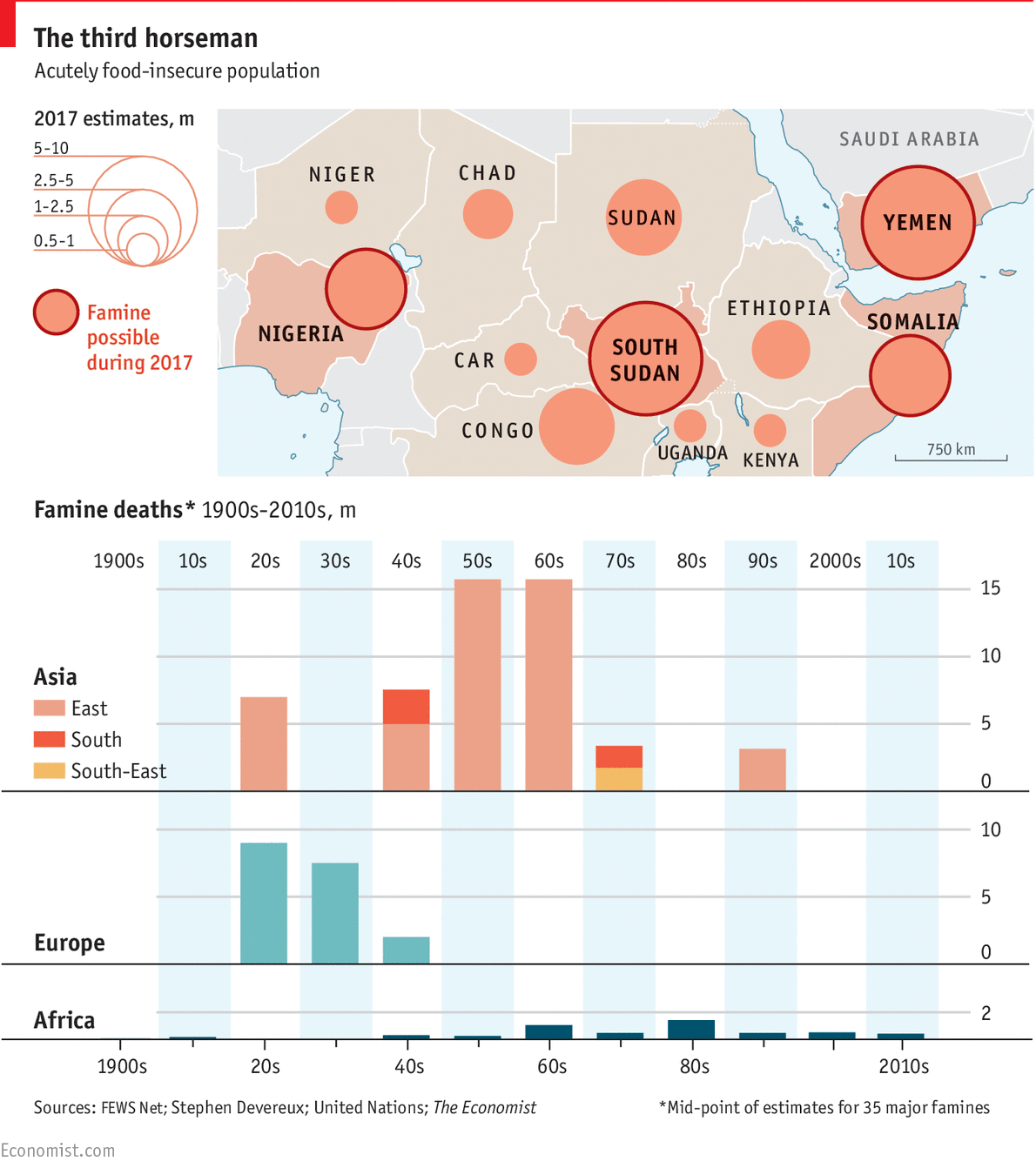The true cause of hunger and famine? War and weak governance

It's time we were honest about the true causes of famine in countries like South Sudan and Yemen. Image: REUTERS/Zohra Bensemra

Get involved with our crowdsourced digital platform to deliver impact at scale
Stay up to date:
Sustainable Development
Here we are again. Famine is back in the news. Following drought in Somalia, Ethiopia and Kenya, the Disasters Emergency Committee has recently launched an appeal for East Africa. We have been reminded that we have one last chance to stop utter devastation in South Sudan. Across the continent more and more horror reveals itself as areas are taken back from Boko Haram by the Nigerian army. Outside Africa, across the Gulf of Aden, we have seen the little bodies of children wasting away in Yemen.
I have written before that aid professionals like me have done a bad job of explaining the reasons behind fragility and crisis – that we need to be more honest about how complex these phenomena are, and not oversimplify what we do. So here I will try to live up to that. That means when we talk about these hunger crises we shouldn’t just ask you to help feed the starving – though that is desperately needed. We should also talk about conflict.

Last year, the World Bank revised its position on conflict – upgrading it from being one of many drivers of suffering and poverty, to being the primary driver. In Somalia, despite some political progress, the conflict has put more than half the population in need of assistance, with 363,000 children suffering acute malnutrition. In Nigeria, conflict with Boko Haram in the country’s northeast has left 1.8 million people still displaced, farmers unable to grow crops, and 4.8 million people in need of food assistance. In Yemen, an escalation in conflict since 2015 has worsened a situation already made dire by poor governance, poverty and weak rule of law. Now more than 14 million people need food aid.
Only if we understand conflict can we understand these hunger crises. South Sudan is another acute example. I worked there for two years following the signing of the Comprehensive Peace Agreement in 2005 and know it well.
Right now a place called Koch, where Mercy Corps works, is in what FEWSNET (the famine early warning system) calls a ‘level 4 emergency phase’, which means that individuals and families will start to die of hunger in a matter of months if they don’t receive enough aid. But until recent years, Koch was a thriving community with fertile land. It has been destroyed in armed clashes since conflict broke out in South Sudan in December 2013. Families have been displaced multiple times and they have reported rampant communal disease due to the lack of clean water. As a father of five told our team in Koch: “I have lost everything; my house was burnt, everything was looted and I do not know how to rebuild my life.”
Across the places we work, where people are facing starvation, the pattern is the same. Hunger is not some freak environmental event; it is human-made, the result of a deadly mix of conflict, marginalization, and weak governance.
In South Sudan, as in Somalia, Nigeria and Yemen it is not generally a lack of food that has caused famine-like conditions to occur. The crises exist because of violence and conflict. They don’t need more food, they need investment into conflict prevention and the stability that brings.
Of course that is easier said than done. Addressing the root causes of conflict and building resilience to crisis is extremely difficult and complicated. But organisations like Mercy Corps are constantly developing new and better ways to deliver peace-building and conflict prevention, particularly at community level. We need these long-term, complex approaches to be supported, because they may mean we do not need another famine appeal. We also need people to understand that we are trying to address the underlying causes.
The World Economic Forum's Global Agenda Council on Fragility, Violence and Conflict found that corporate partners can foster stable, inclusive and prosperous societies that respect the rule of law and benefit from accountable governance. Both local and multinational businesses can play an important role, often working alongside each other to support and grow local and national economies and, in the process, help support efforts undertaken by others to reduce fragility and conflict.
I am not for a moment suggesting we shouldn’t support crisis appeals. Once a community is in the grip of famine it needs assistance, and fast. These responses save lives. But unless we take time to understand and support long-term approaches like conflict prevention and peace-building, we will continue to find ourselves wrestling with protracted crises, forced migration, and the associated security issues that affect every one of us.
Don't miss any update on this topic
Create a free account and access your personalized content collection with our latest publications and analyses.
License and Republishing
World Economic Forum articles may be republished in accordance with the Creative Commons Attribution-NonCommercial-NoDerivatives 4.0 International Public License, and in accordance with our Terms of Use.
The views expressed in this article are those of the author alone and not the World Economic Forum.
Related topics:
The Agenda Weekly
A weekly update of the most important issues driving the global agenda
You can unsubscribe at any time using the link in our emails. For more details, review our privacy policy.
More on Sustainable DevelopmentSee all
Robin Pomeroy and Sophia Akram
April 10, 2024
Eliane Trindade
April 4, 2024
Chirag Chopra and Piyush Gupta
April 2, 2024
Lisa Satolli
April 2, 2024
Pooja Chhabria
March 28, 2024
Andrea Willige
March 27, 2024






